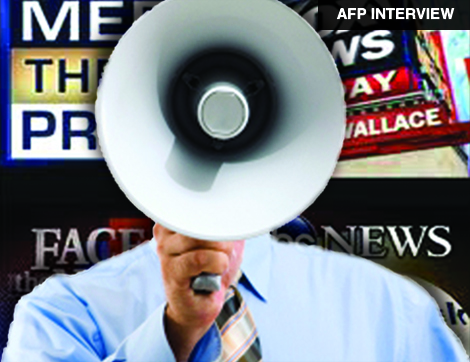
• Former reporter reveals how mainstream news sways public opinion for global elite
By Keith Johnson
The already tarnished reputation of The New York Times suffered another blow recently when one of its former foreign news correspondents went public and accused the newspaper of peddling war propaganda on behalf of the nation’s elite.
“It seemed glaringly obvious to me that ‘all the news fit to print’ was pretty much the news to fit the powerful,” said former Times reporter Daniel Simpson during a September 19 interview with Russia Today. “When I was young, naïve and idealistic, I thought I was holding people in power to account. It turned out instead, when I joined in 2002, that The New York Times was very much engaged in doing what those in power wanted them to do by printing false intelligence information, to start the war in Iraq.”

While working for the Times, Simpson witnessed firsthand how the U.S. government looked for every possible way of getting the so-called “weapons of mass destruction” narrative into the news media, and found America’s “paper of record” to be a willing ally in manufacturing false headlines.
“I was actually asked at one point to invent one myself [while stationed] in the Balkans,” said Simpson. “Initially by the American embassy in Belgrade, but also backed up by a [Times] reporter at the time, Judith Miller, who wanted me to say that Serbs were selling Saddam Hussein weapons of mass destruction delivery systems. It actually turned out that they were selling spare aircraft parts, and that the only plausible explanation for what these might be used for is to put those aging planes back in the sky.”
Of course, the Times wasn’t the only mainstream media outlet colluding with the U.S. government during the formative days of the second Iraq war. In August 2003, CNBC’s Tina Brown asked CNN senior war correspondent Christina Amanpour, if “we in the media, as much as in the administration, drank the Kool-Aid when it came to the war?”
Mrs. Amanpour replied: “I think the press was muzzled, and I think the press self-muzzled. I’m sorry to say, but certainly television and, perhaps, to a certain extent, my station was intimidated by the administration and its foot soldiers at Fox News. And it did, in fact, put a climate of fear and self-censorship, in my view, in terms of the kind of broadcast work we did.”
Simpson joins a growing number of journalists who have recently stepped forward to expose the mainstream media’s widespread self-censorship and deliberate manipulation of news content.
In the October 1, 2012 issue of AMERICAN FREE PRESS, this reporter interviewed former CNN correspondent Amber Lyon, who left the news outlet after she came under fire for exposing brutal atrocities committed by the U.S.-backed Bahraini government. As it turns out, according to Ms. Lyon, “The Bahraini Economic Development Board was actually advertising on CNN and paying for [state-]sponsored programming.”
Veteran news reporter Andrea Seabrook also suffered a crisis of conscience, just before deciding to end her 14-year stint with National Public Radio. “I feel like I am, as a reporter in the capital, lied to every day, all day,” said Seabrook during a recent interview with Washington daily Politico. “There is so little genuine discussion going on with the reporters. . . . To me, as a reporter, everything is spin.”
Although every mainstream media outlet in the country is guilty of capitulating to the whims of the U.S. government and special interests, The New York Times stands out as an enthusiastic participant with a long history of cover-ups and scandals to its name.
After all, it was the Times that knew about the Bush administration’s illegal, warrantless domestic wiretapping program as far back as the 2004 presidential election. But because this issue would have had a major impact on the outcome of that race, the Times Washington bureau chief and executive editor decided to suppress the information until December 16, 2005.
Things are no different today. In July, Times writer Jeremy W. Peters admitted his employer gives government officials and political candidates “quote approval” over statements attributed to them in the newspaper. And just recently, Times national security and intelligence reporter Mark Mazzetti was exposed for conspiring with the same government entity he is supposed to hold accountable.
According to the patriotic group Judicial Watch, the Central Intelligence Agency (CIA) was concerned about an upcoming article by Times columnist Maureen Dowd, who was writing about the CIA’s role in leaking information to Hollywood filmmakers about the alleged raid on Osama bin Laden. In emails obtained through the Freedom of Information Act, it was revealed that CIA spokeswoman Marie Harf reached out to Mazetti and asked for any information about the upcoming piece. Within minutes, Mazetti forwarded a draft of Dowd’s unpublished piece to Harf. At the top of the email, Mazetti wrote: “This didn’t come from me . . . and please delete after you read. See, nothing to worry about.”
In his coverage of this unethical journalistic flap, The Guardian’s Glenn Greenwald writes: “Here we have a New York Times reporter who covers the CIA colluding with its spokesperson to plan for the fallout from the reporting by his own newspaper (‘nothing to worry about’). Beyond this, that a New York Times journalist—ostensibly devoted to bringing transparency to government institutions—is pleading with the CIA spokesperson, of all people, to conceal his actions and to delete the evidence of collusion is so richly symbolic.”
——
Keith Johnson is an independent journalist and the editor of Revolt of the Plebs, an alternative news website. Keith is also a licensed private detective.


